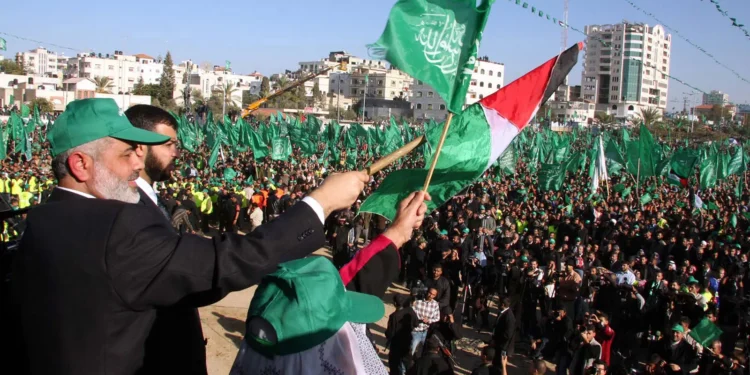As the number of civilian deaths in the ongoing conflict rises, Hamas urges Arab and Muslim countries to take immediate action to halt Israel’s attacks on Gaza.
Hamas Calls for Action to End Gaza Attacks:
Hamas has called on Muslim and Arab countries to act quickly to stop Israel’s relaunched attack on Gaza. The group emphasized that the Organization of Islamic Cooperation (OIC) and the Arab League have a political and moral obligation to step in and put an end to the atrocities. Israel’s air and ground operations have begun, causing hundreds of deaths and worsening the situation in Gaza.
Hamas maintains that to stop the violence and stop more damage, international intervention is required. The ongoing conflict in Gaza has escalated dramatically, prompting urgent calls for intervention from various international actors. Hamas, the Palestinian resistance group, has appealed to Arab and Muslim nations to take immediate action to halt what it describes as a “genocide” being perpetrated by Israel in the Gaza Strip.
Israel Resumes Attacks on Gaza:
Israel resumed military operations in Gaza on Tuesday, including ground offensives and airstrikes in many locations. A temporary ceasefire that had been in effect since January 19 came to an end with this.
Since the strikes started, at least 504 people have died, including more than 190 children, according to Gaza’s civil defence organization. One of the highest fatality tolls since the war started more than 17 months ago is the consequence of the increasing violence.
Hamas’ Appeal for International Intervention:
Hamas has demanded urgent meetings between the Organization of Islamic Cooperation (OIC) and the Arab League in reaction to the stepped-up military operations. The group stresses that these groups have a direct moral and political obligation to step in and put an end to the attacks that are still happening. Hamas has called on these organizations to take measures that will stop the ongoing genocide and violence against the Gaza population.
Global Reaction to the Crisis:
The renewed offensive has triggered international condemnation, with many countries calling for an end to hostilities. Humanitarian organizations have raised concerns about the following:
- Mass civilian casualties, particularly among children.
- Severe damage to homes, hospitals, and essential infrastructure.
- Lack of food, water, and medical supplies in Gaza.
Breakdown of Ceasefire Negotiations:
A truce deal between Israel and Hamas broke down, which led to the most recent escalation. Hamas released Israeli captives in return for Palestinian inmates during the first ceasefire, which permitted a hostage exchange. But more talks broke down since the parties could not agree on certain terms:
- Israel’s Stance: Israel demanded the immediate return of all remaining hostages before agreeing to any extended ceasefire.
- Hamas’ Position: Hamas insisted on engaging in talks for a second phase of negotiations, seeking revised terms before releasing more hostages.
As talks stalled, Israel launched new military operations, intensifying the humanitarian crisis in Gaza.
Humanitarian Concerns and International Condemnation:
There has been strong international condemnation of the renewed offensive. Mass civilian losses, especially among children, and significant damage to vital infrastructure, such as homes and hospitals, have alarmed humanitarian organizations. The terrible situation in Gaza has been made worse by a shortage of food, water, and medical supplies.
Israeli Government’s Position:
If Hamas does not free the other hostages, Israeli Defense Minister Israel Katz has threatened to take portions of Gaza. Katz said that if Hamas would not accept new conditions for a ceasefire agreement, the Israeli Defense Forces would “seize additional territories” and remove the people. This position exacerbates the likelihood of a peaceful settlement and highlights Israel’s tough stance on the conflict.
Domestic Challenges within Israel:
Within Israel, the prolonged conflict has led to significant complications, including waning public support and reservist burnout. Despite heavy reliance on reservists, many are reluctant to return after extended deployments. Prime Minister Netanyahu’s decision to resume bombardments has sparked protests, with accusations that the government is prioritizing political motives over public safety. The conflict has strained domestic consensus and revealed deep mistrust in leadership.
Israel’s Perspective:
Israel justifies its renewed attacks by stating:
- It aims to eliminate Hamas’ military capabilities.
- It is defending itself after Hamas attacked Israel 17 months ago.
- It does not target civilians but claims Hamas operates from populated areas.
However, many analysts argue that Israel’s actions violate international humanitarian laws due to indiscriminate bombings in civilian areas.
Global Diplomatic Efforts:
Hamas has called on Arab and Islamic countries to take urgent action in international forums, particularly the UN Security Council, to implement immediate measures to halt the aggression. The group emphasizes that the attacks are happening in full view of the world, yet no significant steps have been taken to protect Palestinian civilians.
What Happens Next?
Hamas seeks stronger global intervention: Pressure is mounting on Arab and Muslim nations to take more decisive action.
Israel shows no signs of stopping: The military campaign will likely continue unless international forces mediate peace talks.
Humanitarian aid remains uncertain: If access to Gaza remains restricted, food and medical crises will intensify.
Conclusion:
With rising violence, heavy losses, and a worsening humanitarian situation, the battle in Gaza has entered a crucial and perilous stage. The gravity of the crisis is demonstrated by Hamas’s urgent calls for international involvement. Peace attempts have been made more difficult by Israel’s strong position on the release of hostages and the collapse of ceasefire talks. To stop more deaths and bring peace back to the area, diplomatic action is more important than ever as tensions grow.

























